
via MTA
Nov. 16, 2018 By Nathaly Pesantez
After nearly a decade of weekend service changes, closures, and other interruptions on the 7 line due to a massive signal system upgrade, the MTA at last announced that work on the project will wrap up at the end of the month.
The project, which replaces the entire 7 line’s signaling operations to a system known as Communications-Based Train Control, is set to be in service on Nov. 26. It has been underway since 2010, when the MTA selected the contractor for the project.
The new signal system, according to the MTA, will allow for more frequent and reliable service along the 10.5-mile line. It will help dispatchers know where trains are along the tracks with more precision, which the older system lacked. The precision, in turn, will allow dispatchers to have trains travel closer together and at faster speeds, thereby increasing service.
The $588 million CBTC project, however, has blown through several deadlines. It was supposed to be completed more than two years ago, but has encountered many setbacks along the way, including hardware and software issues.
MTA representatives said at a Nov. 13 board meeting that installation was 93 percent complete, with CBTC installed between Main Street and just before Grand Central Station.
Work on the remaining four stops will bring service for the entire Flushing line by the Nov. 26 date. All major testing, in addition, has been completed, with the contractor to stay on board for the next two years to monitor the system.

Workers along the Flushing line (MTA)
While the new communications system is soon to go into service, there will still be some track work after that, according to an MTA spokesperson.
The line’s 500,000 riders, however, are already set to see additional service in April 2019 to offset ridership demands the when the L train shuts down operations between Brooklyn and Manhattan.
The line will see a total of 14 additional round trips during weekday mornings and evenings—five round trips will be added between 8 a.m. and 11 a.m., and nine round trips will be added between 5:30 p.m. and midnight.
MTA documents show that average ridership volumes on the 7 line already warrant four additional round trips split between peak morning and evening hours. Projected ridership on the line for the L tunnel closure, however, bumps the number of additional round trips up to the slated 14.
The CBTC system completion also comes with news of Amazon’s plans to build a campus in Long Island City and subsequent concerns of whether the stressed transit infrastructure can handle the additional 25,000 employees attached to the project.
Amazon, however, will be temporarily operating out of One Court Square beginning in 2019 while its headquarters, spanning millions of square feet, are built around Anable Basin in years to come.
Citi, the anchor tenant of the 50-story tower that has expressed its desire to move out of the 1 million square feet of space it occupies in the building in 2020, is working on an expedited plan to move some its employees out of the building to accommodate Amazon’s plans.
Mayor de Blasio believes the area’s transit system will not be strained in the short term, as Amazon employees will be moving into a building that Citi is already moving out of.
“I don’t think is going to have a huge impact because they’ll be right there with those four subway lines,” he said at a Tuesday press conference, referring to the Court Square station.
While de Blasio touted NYC Ferry as a service that can help with infrastructure concerns, he acknowledged that city and state have to work together to come up with much needed solutions for the area.
“Amazon or no Amazon, this is something we have to address in the long haul,” he said. “Certainly, I’ve heard that from the local representatives many times.”
One Comment

It’s a Thanksgiving miracle.